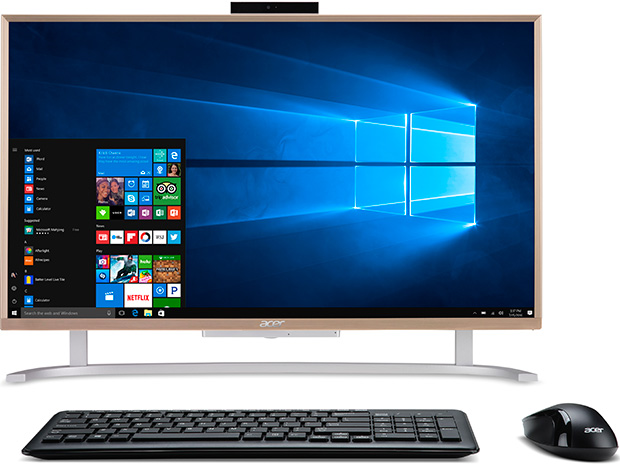Acer Aspire C-Series All-in-Ones Beat CES Rush With Modest Specs And Linpus Linux Option
The Consumer Electronics Show (CES) is barely more than a week away, but not every company is waiting for the annual convention in Las Vegas to show off their new product lines. In an effort to beat the rush, Acer today unveiled its new Aspire C Series of incredibly thin all-in-one systems measuring a scant 8mm, which is thinner than some smartphones, and starting at an affordable $450.
These are sleek and sexy machines with brushed metal backs, optional gold accents, and a stand made out of metal to ensure a sturdy foundation. They're also ergonomic—Acer says users can adjust the display from -5 to +20 degrees (15 degrees titled back or 5 degrees tilted forward), though the AIOs do not support rotate, swivel, or height adjustments.

There are two base models to choose from, at least for now. The first is the aforementioned $450 setup (AC22-270-UR11). It features a 21.5-inch Full HD 1080p (1920x1080) display and pairs an Intel Celeron J3160 quad-core processor (1.6GHz) with 4GB of DDR3L RAM and a 500GB hard drive.
For $150 more, the second model (AC24-760-UR11) offers a bigger 23.8-inch display with the same resolution and kicks things up a notch with an Intel Core i3-6100U dual-core processor (2.3GHz), 8GB of DDR4 RAM, and a 1TB HDD. We think there is more value to be had from this configuration, though someone looking for a basic AIO could certainly do worse than the $450 config.

"The new Acer Aspire C all-in-one desktops are an excellent choice for those desiring a gorgeous PC with ample power at a great price for managing your digital library of music, photos and videos," said Frank Chang, director of stationary products for Acer America.
Neither machine comes with discrete graphics or an optical drive. However, both systems come with two USB 3.0 ports, two USB 2.0 ports, two built-in speakers, 802.11ac Wi-Fi, and Bluetooth 4.0 LE. Acer also offers users a choice between FreeDOS, Linpus Simple Linux, and Windows 10.
These are sleek and sexy machines with brushed metal backs, optional gold accents, and a stand made out of metal to ensure a sturdy foundation. They're also ergonomic—Acer says users can adjust the display from -5 to +20 degrees (15 degrees titled back or 5 degrees tilted forward), though the AIOs do not support rotate, swivel, or height adjustments.

There are two base models to choose from, at least for now. The first is the aforementioned $450 setup (AC22-270-UR11). It features a 21.5-inch Full HD 1080p (1920x1080) display and pairs an Intel Celeron J3160 quad-core processor (1.6GHz) with 4GB of DDR3L RAM and a 500GB hard drive.
For $150 more, the second model (AC24-760-UR11) offers a bigger 23.8-inch display with the same resolution and kicks things up a notch with an Intel Core i3-6100U dual-core processor (2.3GHz), 8GB of DDR4 RAM, and a 1TB HDD. We think there is more value to be had from this configuration, though someone looking for a basic AIO could certainly do worse than the $450 config.

"The new Acer Aspire C all-in-one desktops are an excellent choice for those desiring a gorgeous PC with ample power at a great price for managing your digital library of music, photos and videos," said Frank Chang, director of stationary products for Acer America.
Neither machine comes with discrete graphics or an optical drive. However, both systems come with two USB 3.0 ports, two USB 2.0 ports, two built-in speakers, 802.11ac Wi-Fi, and Bluetooth 4.0 LE. Acer also offers users a choice between FreeDOS, Linpus Simple Linux, and Windows 10.

